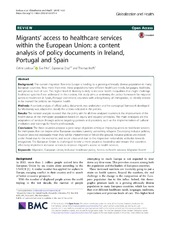| dc.contributor.author | Ledoux, Celine | en_US |
| dc.contributor.author | Pilot, Eva | en_US |
| dc.contributor.author | Diaz, Esperanza | en_US |
| dc.contributor.author | Krafft, Thomas | en_US |
| dc.date.accessioned | 2019-01-23T13:49:03Z | |
| dc.date.available | 2019-01-23T13:49:03Z | |
| dc.date.issued | 2015-06-15 | |
| dc.Published | Ledoux C, Pilot, Diaz E, Krafft T. Migrants access to healthcare services within the European Union: a content analysis of policy documents in Ireland, Portugal and Spain. Globalization and Health. 2018;14 | eng |
| dc.identifier.issn | 1744-8603 | |
| dc.identifier.uri | https://hdl.handle.net/1956/18970 | |
| dc.description.abstract | Background The current migration flow into Europe is leading to a growing ethnically diverse population in many European countries. Now more than ever, those populations have different healthcare needs, languages, traditions, and previous level of care. This higher level of diversity is likely to increase health inequalities that might challenge healthcare systems if not addressed. In this context, this study aims at reviewing the policy framework for migrants’ access to healthcare in Spain, Portugal and Ireland, countries with a long history of immigration, to identify lessons to be learned for policies on migrants’ health. Methods A content analysis of official policy documents was undertaken and the conceptual framework developed by Mladowsky was adapted to classify the actions indicated in the policies. Results The content analysis revealed that the policy aim for all three analysed countries is the improvement of the health status of the immigrant population based on equity and equality principles. The main strategies are the adaptation of services through actions targeting patients and providers, such as the implementation of cultural mediators and trainings for health professionals. Conclusion The three countries propose a great range of policies aiming at improving access to healthcare services for immigrants that can inspire other European countries currently welcoming refugees. Developing inclusive policies, however does not necessarily mean they will be implemented or felt on the ground. Inclusive policies are indeed under threat due to the economic and social crises and due to the respective nationalistic attitudes towards integration. The European Union is challenged to take a more proactive leadership and ensure that countries effectively implement inclusive actions to improve migrant’s access to health services. | en_US |
| dc.language.iso | eng | eng |
| dc.publisher | BMC | eng |
| dc.relation.uri | https://www.ncbi.nlm.nih.gov/pmc/articles/PMC6003193/ | |
| dc.rights | Attribution CC BY | eng |
| dc.rights.uri | http://creativecommons.org/licenses/by/4.0/ | eng |
| dc.subject | Migration | eng |
| dc.subject | European Union | eng |
| dc.subject | Inclusive healthcare policy | eng |
| dc.subject | Access to health services | eng |
| dc.subject | Migrants’ health | eng |
| dc.title | Migrants access to healthcare services within the European Union: a content analysis of policy documents in Ireland, Portugal and Spain | en_US |
| dc.type | Peer reviewed | |
| dc.type | Journal article | |
| dc.date.updated | 2018-08-23T13:36:21Z | |
| dc.description.version | publishedVersion | en_US |
| dc.rights.holder | Copyright 2018 the authors | |
| dc.identifier.doi | https://doi.org/10.1186/s12992-018-0373-6 | |
| dc.identifier.cristin | 1604111 | |
| dc.source.journal | Globalization and Health | |

